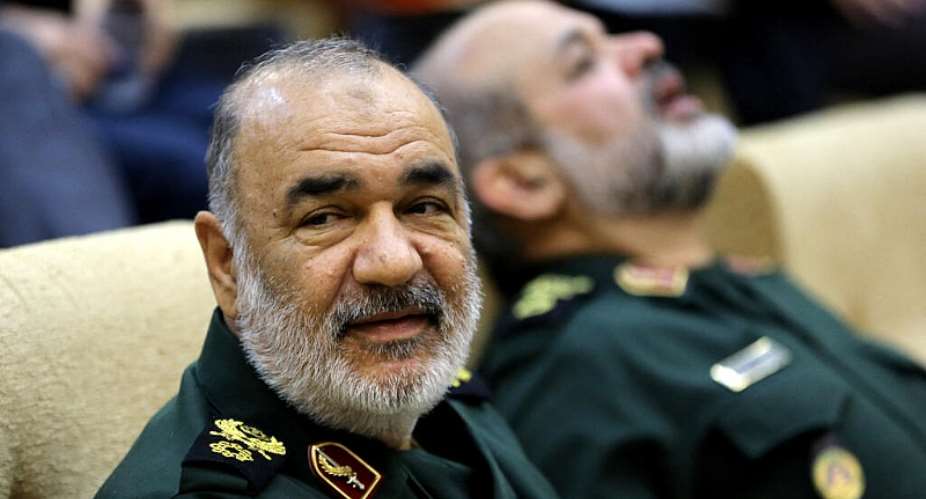Tehran reacted angrily after the European Parliament called on Thursday for the EU to list Iran's Revolutionary Guards as a terrorist organisation. The parliamentary motion blames the powerful force for the repression of protesters and the supply of drones to Russia.
Tehran condemned the motion's call to blacklist the Islamic Revolutionary Guard Corps (IRGC) as a terrorist organisation, which may imply that Brussels could open the way for sanctions against the militia.
On 16 January, the European Parliament presented an "EU response to the demonstrations and executions in Iran".
It hit out at that the crackdown by Iran, including the IRGC, on the demonstrations after the death of Mahsa Amini, following her arrest, abuse and ill-treatment by Iran's 'morality police'.
It also called for the EU Commission to include the IRGC on the EU's terrorist list "in the light of its terrorist activity, the repression of protesters and its supplying of drones to Russia".
The motion was overwhelmingly adopted on Thursday with 598 votes in favour and nine against, with 31 abstentions.
"Consequences"
Iran's government controlled Mehr News Agency quotes a statement by the country's general staff saying that “in addition to being unprecedented in international rules and regulations, the recent move by the European Parliament will affect regional and global security, tranquility and peace, and the European Parliament must be careful about its consequences.”
"This is a motion basically trying to get the [EU] Commission to instigate restrictive measures of sanctions within the European Union," Dr. Rouzbeh Parsi of the Swedish Institute for International Affairs (UI) and co-founder of the European Middle East Research Group (Emerg.) told RFI. "It's not something that the European Parliament can do by itself."
According to Parsi, the actual impact of the EU motion on the IRGC will be primarily symbolic. "But it risks to ruin an already very fraught relationship between the European Union and Iran," he added.
Currently, discussions between Iran and the "P5+1" (the five permanent members of the UN Security Council – France, the United Kingdom, the United States, China and Russia plus Germany) have stalled after the then US President Donald Trump unilaterally walked away in May 2018 from the Joint Comprehensive Plan of Action (JCPOA), the deal aimed at controlling Tehran's nuclear program.
Last year, discussions continued with Trump's successor, Joe Biden. His administration has showed signs that it wants to re-enter the JCPOA. But more recently, talks stalled again.
"Does the JCPOA still have a chance?" mused Parsi. "And what is the impact on that when you are instigating this kind of motion? It will make it more difficult to try to revive the JCPOA, which I think the people who instigated the [European Parliament's] motion seem to fully misunderstand."
Overall, Parsi says he thinks that the motion lacks coherence. "It contains all kinds of more or less reasonable, unreasonable and weird things.
"And then we don't even get into the to the amendments, which they all voted against. It contains all kinds of complaints and few ideas on how to constructively move forward," he said.
Apart from the 2006 sanctions that were put in place by the UN as a reaction to Tehran's suspected nuclear weapons program, the EU put in place more "restrictive measures" against Iran at the end of last year. The EU said it was in response to the use of Iranian drones helping Russia with its invasion into Ukraine.
The EU Commission will now have to decide if it wants to step up pressure and adopt the EU Parliament's motion.
The UK is expected to make a similar decision in the weeks to come.





 Lay KPMG audit report on SML-GRA contract before Parliament – Isaac Adongo tells...
Lay KPMG audit report on SML-GRA contract before Parliament – Isaac Adongo tells...
 Supervisor remanded for stabbing businessman with broken bottle and screwdriver
Supervisor remanded for stabbing businessman with broken bottle and screwdriver
 NDC watching EC and NPP closely on Returning Officer recruitment — Omane Boamah
NDC watching EC and NPP closely on Returning Officer recruitment — Omane Boamah
 Your decision to contest for president again is pathetic – Annoh-Dompreh blasts ...
Your decision to contest for president again is pathetic – Annoh-Dompreh blasts ...
 Election 2024: Security agencies ready to keep peace and secure the country — IG...
Election 2024: Security agencies ready to keep peace and secure the country — IG...
 People no longer place value in public basic schools; new uniforms, painting wil...
People no longer place value in public basic schools; new uniforms, painting wil...
 'Comedian' Paul Adom Otchere needs help – Sulemana Braimah
'Comedian' Paul Adom Otchere needs help – Sulemana Braimah
 Ejisu by-election: Only 33% of voters can be swayed by inducement — Global InfoA...
Ejisu by-election: Only 33% of voters can be swayed by inducement — Global InfoA...
 Minority will expose the beneficial owners of SML, recover funds paid to company...
Minority will expose the beneficial owners of SML, recover funds paid to company...
 Prof. Opoku-Agyemang has ‘decapitated’ the NPP’s strategies; don’t take them ser...
Prof. Opoku-Agyemang has ‘decapitated’ the NPP’s strategies; don’t take them ser...
